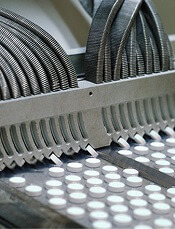
Credit: FDA
Results of a phase 1 study suggest the PI3K delta inhibitor idelalisib can produce durable responses in certain patients with relapsed or refractory disease.
The drug elicited a response rate of 72% in patients with chronic lymphocytic leukemia (CLL), 47% in indolent non-Hodgkin lymphoma (iNHL), and 40% in mantle cell lymphoma(MCL).
The median duration of response was 16.2 months among CLL patients, 18.4 months among iNHL patients, and 2.7 months among those with MCL.
“Considering the high number of previous therapies that these patients had received, higher than we sometimes see in comparable studies, the efficacy of idelalisib that we observed was remarkable,” said study author Ian Flinn, MD, PhD, of the Sarah Cannon Research Institute in Nashville, Tennessee.
In 3 papers published in Blood, Dr Flinn and his colleagues presented data from this phase 1 study of idelalisib. After an initial study involving all trial participants, the patients were separated into CLL, iNHL, and MCL disease cohorts.
Solid survival rates in CLL
The researchers evaluated idelalisib in 54 patients with relapsed or refractory CLL. The patients had received a median of 5 prior treatments (range, 2-14).
They had a median age of 63 years (range 37-82), 80% had bulky lymphadenopathy, 70% had treatment-refractory disease, 91% had unmutated IGHV, and 24% had del17p and/or TP53 mutation.
In the primary study, the patients received idelalisib at doses ranging from 50 mg to 350 mg once or twice daily for 48 weeks. If they continued to derive clinical benefit, patients could continue treatment on an extension study.
Fifty-four percent of patients discontinued treatment during the primary study period. Twenty-eight percent stopped because of disease progression, 9% due to adverse events (AEs), and 6% due to early deaths resulting from AEs.
Grade 3 or higher AEs included pneumonia (20%), neutropenic fever (11%), diarrhea (6%), pyrexia (4%), cough (4%), and fatigue (2%). Common grade 3 or higher lab abnormalities included neutropenia (43%), anemia (11%), and thrombocytopenia (17%).
The overall response rate was 72%, with 39% of patients meeting the criteria for partial response per IWCLL 2008 criteria and 33% meeting the criteria of partial response in the presence of treatment-induced lymphocytosis.
The median duration of response was 16.2 months, the median progression-free survival (PFS) was 15.8 months, and the median overall survival was not reached.
Longer response duration in iNHL
The researchers evaluated idelalisib in 64 patients with iNHL. Lymphoma types included follicular lymphoma (59%), small lymphocytic lymphoma (17%), marginal zone lymphoma (9%), and lymphoplasmacytic lymphoma (14%).
Patients had a median age of 64 years (range, 32-91), 53% had bulky disease, and 58% had refractory disease. They had received a median of 4 prior therapies (range, 1-10).
The patients received idelalisib at doses ranging from 50 mg to 350 mg once or twice daily. After 48 weeks, patients still benefitting from treatment (30%) were enrolled in an extension study.
The remaining 70% of patients discontinued treatment during the primary study. Nineteen percent of these patients discontinued due to AEs.
Grade 3 or higher AEs included pneumonia (17%), diarrhea (9%), peripheral edema (3%), fatigue (3%), rash (3%), pyrexia (3%), nausea (2%), and cough (2%). Grade 3 or higher lab abnormalities included AST elevation (20%), ALT elevation (23%), neutropenia (23%), thrombocytopenia (11%), and anemia (5%).
The overall response rate was 47%, with 1 patient (1.6%) achieving a complete response. The median duration of response was 18.4 months, and the median PFS was 7.6 months.
Short response, survival duration in MCL
The researchers evaluated idelalisib in 40 patients with relapsed or refractory MCL. The median age was 69 years (range, 52-83). Patients had received a median of 4 prior therapies (range, 1-14), and 43% were refractory to their most recent treatment.
Patients received idelalisib at doses ranging from 50 mg to 350 mg once or twice daily for a median of 3.5 months (range, 0.7-30.7). Six patients (15%) continued treatment for more than 48 weeks, although only 1 patient remains on treatment at present.
The 34 patients who discontinued the primary study did so because of progressive disease (60%), AEs (20%), withdrawn consent (3%), or investigator request (3%). Of the 6 patients who entered the extension trial, 4 ultimately discontinued due to progressive disease and 1 due to AEs.
Grade 3 or higher AEs included diarrhea (18%), decreased appetite (15%), pneumonia (10%), nausea (5%), fatigue (3%), and rash (3%). Grade 3 or higher lab abnormalities included ALT/AST elevations (20%), neutropenia (10%), thrombocytopenia (5%), and anemia (3%).
The overall response rate was 40%, with 5% of patients achieving a complete response. The median duration of response was 2.7 months, and the median PFS was 3.7 months.
Despite the modest duration of survival observed in these patients, the researchers believe the strong initial response to idelalisib suggests the drug could still prove useful in patients with MCL.
“[I]delalisib is unlikely to receive designation as a single-agent therapy in mantle cell lymphoma due to the short duration of response,” said study author Brad S. Kahl, MD, of the University of Wisconsin Carbone Cancer Center in Madison.
“The path forward will likely include administering it in combination with other agents or developing second-generation PI3 kinase inhibitors.”

